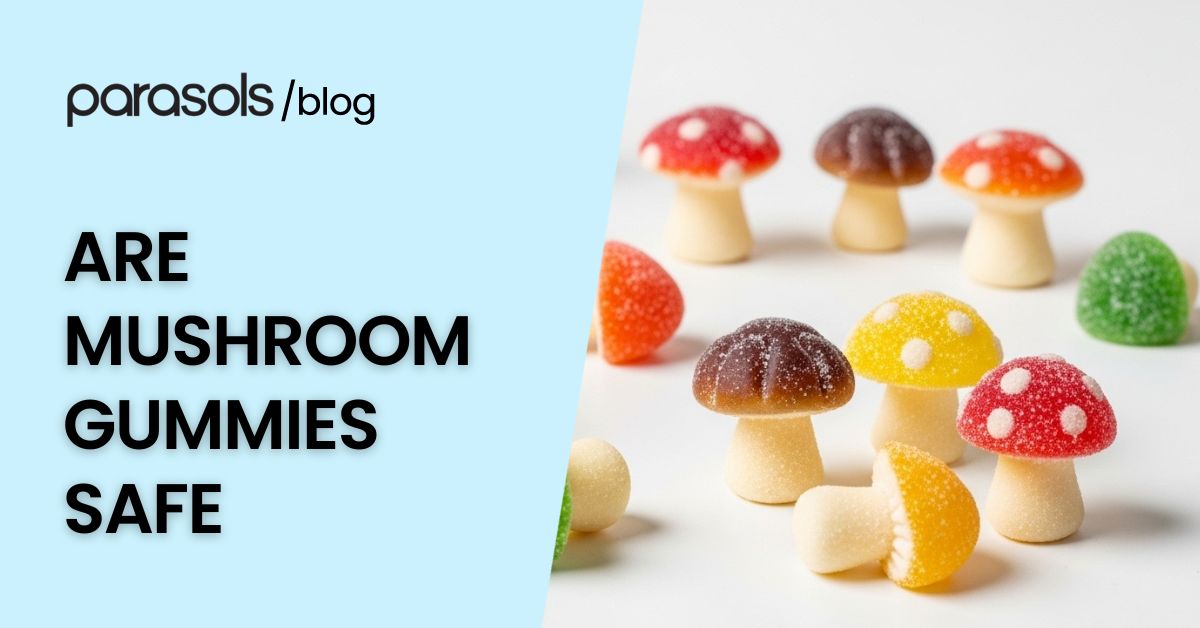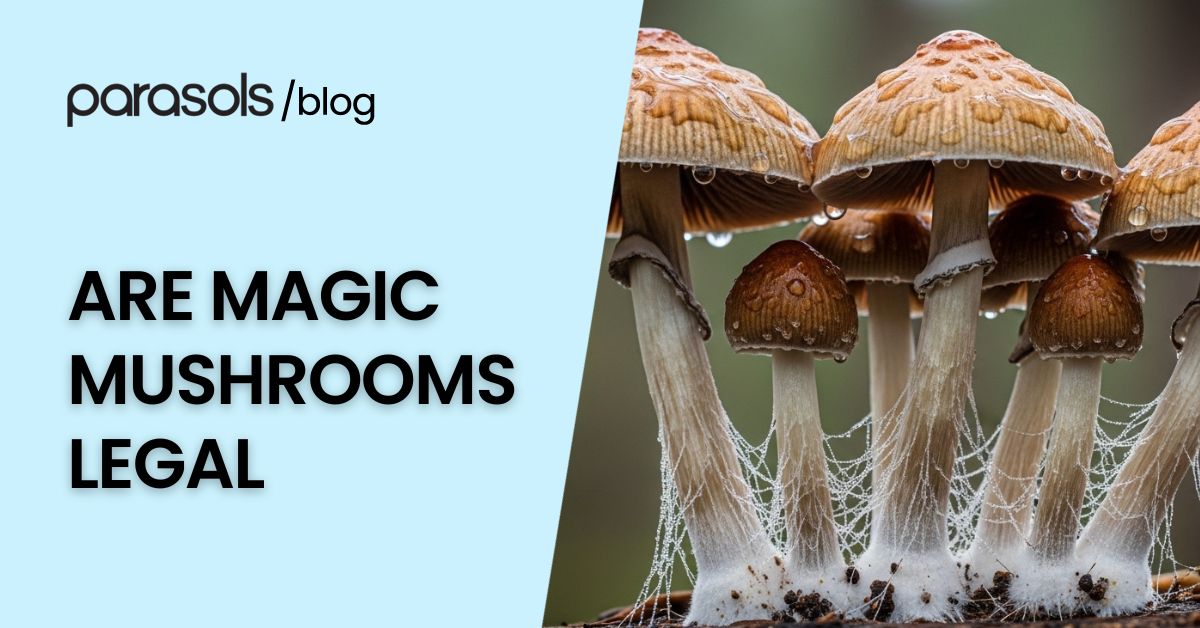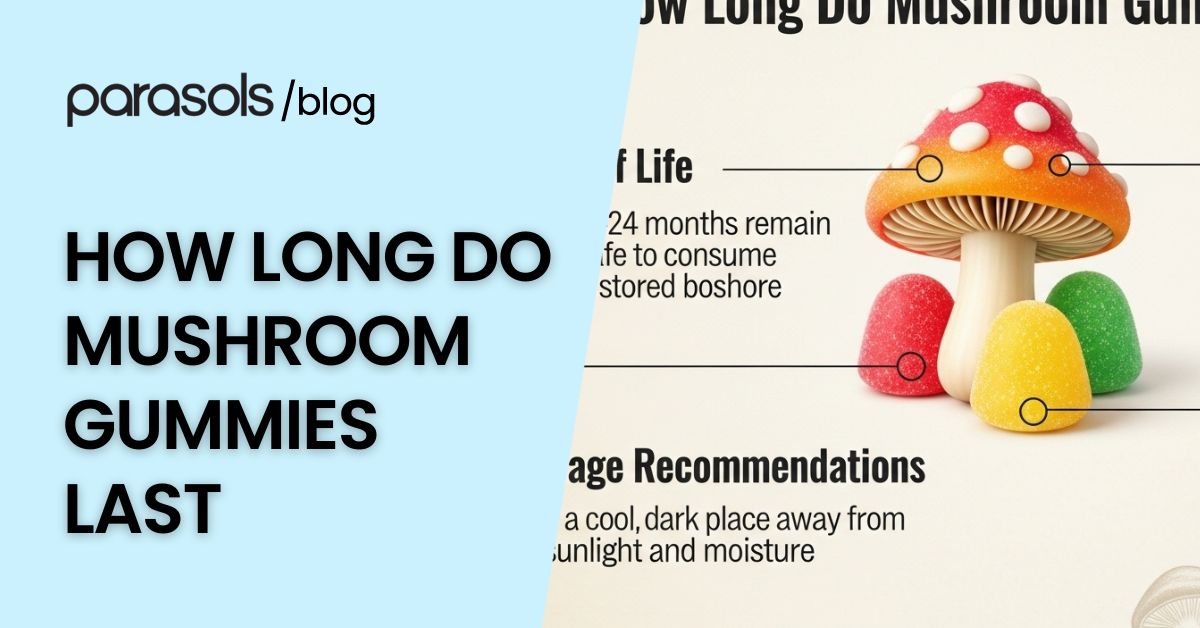Mushroom gummies—often marketed as nootropics or wellness supplements—are growing in popularity, but not all are created equal. Have you ever asked yourself; are mushroom gummies safe? With concerns about undisclosed ingredients and psychoactive compounds like psilocybin or muscimol, it’s essential to understand how to use these products safely. Here's what you need to know before taking mushroom gummies.
Are Mushroom Gummies Safe?
Mushroom gummies may seem like a convenient and tasty way to consume functional or psychedelic mushrooms, but their safety depends heavily on ingredients, dosage, and source. Parasols offer high quality mushroom gummies like our pineapple non detect shroom gummies.
Some brands claim to contain legal nootropics or a proprietary mushroom blend, while others may include unlabeled or unregulated substances like muscimol, ibotenic acid, or amanita muscaria extracts—compounds with hallucinogenic effects and high potential for harm.
Reports, including from institutions like the University of Virginia, Blue Ridge Poison Center, and the Herbert Wertheim School of Public Health, have cited cases of gummies—some even marketed with “Mario mushroom” imagery—leading to hallucinations or health risks, including in a 3-year-old child.
Given concerns raised by toxicologists and studies published in sources like the Morbidity and Mortality Weekly Report, it is critical to approach mushroom edibles with caution and full awareness of their true contents.
Tips to Safely Take Magic Mushrooms
Using magic mushrooms, including in gummy or edible form, comes with both potential benefits and significant risks. Whether you're studying for wellness, curiosity, or therapeutic interest, taking the right precautions can help reduce harm and improve the experience. Here are essential tips to follow:
1. Know What You’re Taking
Make sure the mushroom edibles are clearly labeled and sourced from a reputable brand. Products should list whether they contain psilocybin, psilocin, or amanita muscaria. Be cautious of mushroom gummies labeled with proprietary blends or nootropics, which may contain undisclosed ingredients.
2. Start with a Low Dose
Especially for first-time users, begin with a small amount. The effects of psychedelic compounds like psilocybin can be intense and unpredictable. Microdosing is often used as a safer introduction to assess how your body responds.
3. Avoid Mixing with Other Substances
Combining mushroom gummies with alcohol, kratom, or other psychoactive substances can increase health risks and lead to unpredictable effects or interactions. Stick to one substance at a time.
4. Choose a Safe, Calm Environment
Take mushrooms in a familiar, secure place with someone you trust. This is particularly important for those prone to anxiety or first-time users, as hallucinations and disorientation are possible.
5. Be Aware of Legal and Health Implications
Psilocybin and psilocin are classified as Schedule I substances in many areas, meaning they’re illegal and considered to have a high potential for abuse and no accepted medical use. Always check local laws and consider public health warnings issued by poison control centers, the Food and Drug Administration.
6. Avoid Use in Children and Vulnerable Individuals
There have been reports of young children consuming mushroom gummies and experiencing harmful effects. Keep all mushroom products securely stored and out of reach.
7. Consult a Medical Professional
If you're taking medications, have underlying health conditions, or are uncertain about the risks, consult a healthcare provider. A medical toxicologist or emergency medicine expert can offer guidance, especially in the case of accidental ingestion or adverse symptoms.
How to Choose Quality Magic Mushrooms

Choosing high-quality magic mushrooms or mushroom gummies is key to ensuring safety and minimizing unwanted effects. Here’s what to look for when selecting a reliable product:
- Clear Labeling: Look for products that are labeled to contain specific compounds like psilocybin, psilocin, or amanita muscaria, and avoid those with vague terms like “proprietary mushroom blend.”
- Reputable Brand: Choose established brands of mushroom gummies that are known in the market and have positive reviews. Avoid obscure or unverified sellers, especially from gas stations or smoke shops.
- Lab Testing: Opt for products that have been lab-tested and found to contain the ingredients listed on the label. Avoid items that might contain undisclosed or unregulated substances.
- Avoid Edibles for Kids: Mushroom edibles like gummies and chocolates should never be marketed toward or accessible to children, as they may cause undesired symptoms or toxicity.
- Ingredient Transparency: Avoid gummies that include unknown nootropics or substances that produce opioid-like effects, such as kratom, unless verified by health authorities.
- Check for Health Alerts: Refer to public health sources like the Centers for Disease Control or Poison Control Center for any warnings about specific products or brands.
Are Mushroom Gummies Legal?
The legality of mushroom gummies depends on their ingredients and the laws of your state or country. Products containing psilocybin or psilocin—both considered Schedule I substances by the U.S. Food and Drug Administration—are illegal in most jurisdictions due to their high potential for abuse and lack of accepted medical use.
However, some mushroom gummies marketed as legal may contain alternative compounds like amanita muscaria or “mushroom nootropics,” which remain largely unregulated. These products are often sold in gas stations and smoke shops, but may still pose legal and health risks, especially if they contain undisclosed or psychoactive ingredients. Always check local regulations and avoid products that aren’t clearly labeled or verified.
Quick Mushroom Guide
|
Mushroom |
Active Compounds |
Common Use in Gummies |
Best For… |
|
Psilocybe spp. (e.g., P. cubensis, P. semilanceata) |
psilocybin → psilocin |
Often absent from legal gummies—only in illicit “magic mushroom” edibles. |
Psychedelic experiences, introspection, altered perception |
|
Amanita muscaria |
muscimol, ibotenic acid |
Featured in “legal psychedelic” gummies—sold in gas stations/smoke shops. |
Dreamy sedative-hallucinogenic effects with less visual intensity |
|
Lion’s Mane |
hericenones, erinacines (neurotrophic compounds) |
Functional nootropic gummies in wellness blends. |
Cognitive support, focus, neuroplasticity |
|
Reishi |
triterpenoids, polysaccharides |
Included in calming, immune-support gummies. |
Stress relief, immune regulation |
|
Cordyceps |
cordycepin |
Energy-boosting functional mushroom gummies. |
Endurance, athletic performance |
|
Chaga, Turkey Tail, Chaga, Shiitake, Maitake |
various polysaccharides, antioxidants |
Mixed into wellness-focused mushroom gummies (e.g., CBDfx). |
Immune support, antioxidant benefits |
Final Thoughts

Mushroom gummies offer a unique way to know the effects of functional and psychedelic mushrooms, but they come with real risks—especially when ingredients are undisclosed or unregulated. By understanding what’s in these products, staying informed about legal and health concerns, and following safe usage practices, you can make more responsible decisions and protect your well-being.
Understanding the risks, ingredients, and legal considerations of mushroom gummies can help ensure safer use. By staying informed and following best practices, readers can make responsible decisions that protect their health and well-being.
Frequently Asked Questions
Can mushroom gummies cause a positive drug test?
Yes, if the gummies contain psilocybin or psilocin, they may trigger a positive result on certain drug tests that screen for hallucinogens. Functional mushroom gummies (like those with lion’s mane or reishi) typically do not affect drug tests.
How long do the effects of mushroom gummies last?
The effects of psychedelic mushroom gummies usually begin within 30–60 minutes and can last 4–6 hours, depending on the dose and individual metabolism. Functional mushroom gummies do not cause psychedelic effects and may produce more subtle, long-term benefits.
Are mushroom gummies addictive?
Psilocybin and other psychedelics are not considered physically addictive, but they may lead to psychological dependence with frequent use. Some unregulated gummies might also contain other substances, such as kratom, which carry a risk of addiction.
Can I travel with mushroom gummies?
Traveling with mushroom gummies that contain psilocybin or other Schedule I substances is illegal and can result in serious legal consequences. Even legal functional mushroom products should be checked against local laws and airport regulations.
What should I do if someone overdoses on mushroom gummies?
If someone experiences severe symptoms or an overdose—like hallucinations, confusion, agitation, or loss of consciousness—call emergency services immediately. Poison control centers and emergency medicine providers can guide appropriate care, especially if the product contains unknown or psychoactive compounds.



Leave a comment
This site is protected by hCaptcha and the hCaptcha Privacy Policy and Terms of Service apply.